Home with the Kids during Coronavirus: An Opportunity
Author: Jocelyn Meek
Home with the Kids during Coronavirus: An Opportunity
You’re home with the kids for the foreseeable future and wondering how you’re going to cope: will they keep up on schoolwork? Will you be able to get any work done? Will you all go stir-crazy?
The key to thriving in this uncertain situation is how you frame it, says Rana Chudnofsky, MEd, director of BHI’s Resilient Youth program.
“We’re being given the unexpected gift of time by having our children at home,” Chudnofsky says. “This is also a time of appreciation: aren’t we lucky to be able to be home together. Talk about and appreciate the people who are working every day – first responders, medical professionals, the people at the grocery story and the mail carrier. We need to remind ourselves how lucky we are to have these people here to support us.”
Being home together can be challenging and overwhelming since we are used to highly scheduled lives, but we can find gratifying ways to be together on a day-to-day basis.
Chudnofsky offers some ideas:
- It is important to give your children time to talk about their feelings, and really listen.
- Remain optimistic. Children sense when we are anxious, so try to remain balanced in your own body and mind and your children will learn by example.
- Limit technology. Instead of directing children to technology, we have the opportunity to spend mindful time with them and offer new opportunities for learning. Instead of being too busy to be present for our children, we have the luxury of time to create shared learning opportunities with a home schedule.
- Maintain a level of normalcy and make time for creativity. We know that most children do better with structure. Perhaps we can create a daily schedule that includes structure as well as time for imagination and play.
- Stay connected. Technology can provide ways to maintain and strengthen relationships with family and friends near and far. You can make phone calls, set up group chats, text supportive messages, send photos and make cards to mail.
This is also an opportunity to learn about caring for community. Who lives in your area? Are there any elderly people that are alone who might need a daily check-in call? Are there any people dealing with illness in your neighborhood who can use a supportive phone call? How well do you know your cousins? This could be a good time to get to know your extended family, or perhaps you can delve into your genealogy.
Things families can do together:
- Create a jar that holds words of thankfulness. Each family member writes something they are thankful for and puts it in the jar to read at a later date.
- Create a family meditation and a special place that you are all enjoy together. For example, if you all enjoy going to the ocean and have a favorite place, create a relaxing meditation where you are together, relaxed and happy in this special place.
- Enjoy a game of charades.
- Getting outside for fresh air and sunshine
- Read a book together.
- Create a story together.
- Cook together. (You can make it both a math and science lesson!)
- Arrange video play dates to connect with day care and school friends
For older kids
- They can journal about this time.
- Map out a trip in your mind.
- Read a book and then watch the movie and compare it.
- Explore your local library website with your child.
- Explore on-line events.
- Enjoy audible books with children of all ages.
“This Coronavirus can give us a great opportunity stop, pause and enjoy the people we have in our lives. If we look at this as an opportunity, we can optimize our experiences and enjoy one another,” Chudnofsky said.
Calm in the Time of Coronavirus
Caution and concern rule the day in the time of Coronavirus, as well it should. But as we work together to prevent the spread of the virus and protect ourselves and our families form infection, there are ways we can both manage our stress and boost our self-care.
“The way I think of it is, if you’re going to be Purell-ing your hands all the time – or as you are washing your hands throughout the day – you can actually practice meditation,” says BHI Medical Director Darshan Mehta, MD. “Hand washing or use of hand sanitizer is a perfect cue to do a mini relaxation. While you are moving your hands together, you are counting and breathing deeply, so this gives you both the benefits of fighting off the virus and the internal benefit of knowing that you are taking care of yourself.”
The news about Coronavirus (aka COVID-19) can be overwhelming, Dr. Mehta says. It has proven highly contagious with a rapid global transmission; many businesses have been affected and people are more and more cancelling trips and large gatherings, self-quarantining and working from home.
The best way to approach these uncertain times is to be practical, Dr. Mehta said.
“Follow trusted scientific sources like the Centers for Disease Control instead of social media or cable news,” Dr. Mehta said. “And be practical: if you’re in an area where there are a lot of new cases of the virus, ask yourself, ‘Is there a way I can meet with people in a different way right now? Can I work from home or connect via Skype or Zoom?’”
Maintaining social support and avoiding isolation is a resilient response to the virus, Dr. Mehta says. Even if you are quarantined, you can continue to stay connected with your friends, neighbors, coworkers etc. through modern technology.
We can also increase our ability to fight off the disease by maintaining personal health. Maintaining healthy eating habits, getting good sleep each night and exercising regularly can boost our immune systems and improve our ability to fight the virus. While you may find the need to adapt some habits – perhaps working out at home instead of a gym or at the very least carrying sanitizing wipes to clean equipment – we can continue to maintain emotional equilibrium.
“Yes, this is a scary thing, but we can still do many things to optimize our health and wellbeing and we can still enjoy life,” Dr. Mehta said.
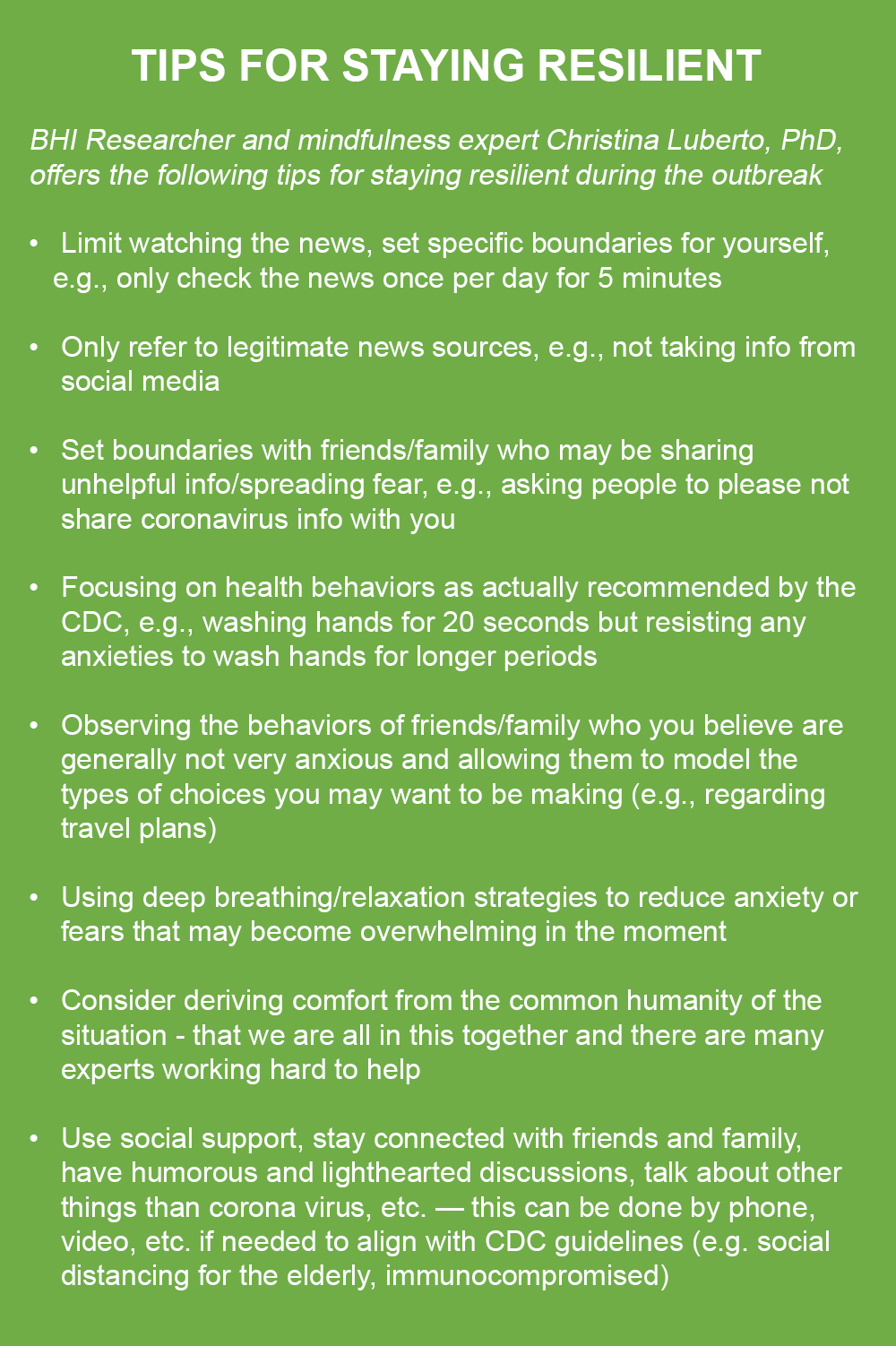
The Best Way to Stick to Your New Year’s Resolutions: Choose Joy
It’s a New Year and a New You – right?
If you’re setting resolutions for the new year, be sure the goals you’ve set for yourself will influence joy in your life, says BHI’s Dr. Ellen Slawsby.
“The biggest thing is remembering that New Year’s resolutions are for us to enhance the value of our lives,” Dr. Slawsby said.
Whatever your resolution – diet or exercise, improving relationships, doing good deeds – reminders and rewards are key to staying true to your goal. Here are some simple tips Dr. Slawsby recommends as you move through the year:
- Setting reminders: once a week, remind yourself (via scheduled reminders on your smartphone, notations in your pocket calendar, post-it’s on your fridge) to evaluate how you’ve done in the past week. By doing this, we’re also reaffirming that this is an important goal and if we didn’t do well this past week, then we will commit to doing better next week.
- Journaling: jot down some notes about how adhering to (or not adhering to) your resolution is making you feel. Are you happier now that you are exercising more? How did you feel about reaching out to a friend you haven’t heard from in a few years? Did you feel pride or gratitude when you donated to a charity? As the year progresses, you will be able to look back and reflect on your progress and be grateful for what you have and all you’ve accomplished. “It brings you joy all over again,” Dr. Slawsby said.
- Checking in with others: sometimes letting others know about our resolutions can help, because they will also give us gentle reminders. Also, for some, it’s not a commitment unless others know we’ve made it.
- Rewarding yourself for good behavior: if you’re dieting, put a dollar in a jar for every pound you lose, so you can splurge on a new clothing item for yourself when you meet your goal. If you’ve been volunteering more time to others, also reward yourself with time spent on things you love – reading, gardening, etc.
“Resolutions aren’t just to fix problems, but to reframe our thoughts and lives in a more positive or healthier way,” Dr. Slawsby said. “You’ve got to not only stop eating cookies, but change the way you think about food – and yourself – if you want lasting change.”
Dr. Fricchione Pays Tribute to Rosalynn Carter
Working for Mrs. Rosalynn Carter and President Carter, during a stint I had at the Carter Center, was one of the highlights of my career. I came to know Mrs. Carter quite well given her focus on improving mental health care through her Carter Center Mental Health Program. She was a wise, modest and kind person who treated everyone with respect, dignity and compassion regardless of their station in life. I had never known a celebrity before, and she impressed me greatly with her warmth and authenticity. She was a genuinely graceful person. But it should be mentioned that she combined her natural warmth with a steely resolve to do the right thing. This special amalgamation of qualities earned her the nickname, “the steel magnolia”. And I can attest to her determination to make life better for those suffering from illness and poverty and discrimination.
Mrs. Carter had so many accomplishments that made the world a better place. She and President Carter were of one mind in this respect. In this era, when so many enterprises are transactional and profit and power driven, the Carters exemplified something radically different. It seems to me their motto was–“Everything fits when we all work together for each other”. And just being at the Carter Center campus somehow filled the atmosphere with this philosophy. I’ve taken this lesson with me from my time there working with Mrs. Carter and it has guided my efforts at Massachusetts General Hospital and the Benson-Henry Institute here.
I am sorry that she no longer walks on this planet with us, but I join the multitude of people who are thankful for the life she led. She sure has earned her eternal peace.
– BHI Director Gregory L. Fricchione, MD
Register for The Herbert Benson, MD Course in Mind Body Medicine Oct 27-29, 2022
October 27-29, 2022 In-Person AND Live Streaming
We are pleased to announce that registration is now open for The Herbert Benson, MD Course in Mind Body Medicine, the Benson-Henry Institute’s celebrated continuing medical education (CME) course, offered in partnership with Harvard Medical School.
The course will be held live in person October 27-29, 2022 at the Renaissance Waterfront Hotel in Boston, MA and will be livestreamed to participants around the world. Video recordings of all talks will be available to all conference-goers for up to 60 days. For the first time ever, BHI is also offering an optional online pre-course workshop, Group Medical Visits to Guide Patients to Healthier Lifestyle Behaviors.
“The Herbert Benson Course in Mind Body Medicine is an opportunity for clinicians, researchers, scientists and mind body enthusiasts to explore the latest research and learn the best techniques in mind body medicine. Our work – providing patients with skills to build resilience and improve wellbeing – are essential as we rebound from the pandemic and face a multitude of other stressful challenges at home and abroad. We are so pleased to be able to meet each other again in person this fall, and to provide online streaming to participants around the world. The course provides a wonderful opportunity to connect and collaborate with colleagues around the world,” said BHI Director Gregory Fricchione, MD. “We have an impressive line-up of keynotes and experts in the field, and this year we are offering an exciting new optional half-day course on delivering mind body medicine in group visits.”
Keynote speakers are renowned healthy aging researcher Elissa Epel, Ph.D., co-author of “The Telomere Effect” (2017) with Elizabeth Blackburn, a NYT bestseller under the category of Science; Laura Kubzansky, PhD, co-director of the Lee Kum Sheung Center for Health and Happiness, and director of the Society and Health Laboratory at the Harvard T.H. Chan School of Public Health; internationally recognized thought and practice leader Rhonda V. Magee M.A., J.D., author of The Inner Work of Racial Justice: Healing Ourselves and Transforming Our Communities Through Mindfulness (2019); and Tyler J. VanderWeele, Ph.D., Director of the Human Flourishing Program and Co-Director of the Initiative on Health, Religion and Spirituality at Harvard University.
This program is among the highest-rated Harvard Medical School CME course. The Harvard Medical School is accredited by the Accreditation Council for Continuing Medical Education (ACCME) to provide continuing medical education for physicians. The Harvard Medical School designates this live activity for a maximum of 27.75 AMA PRA Category 1 Credits™. Physicians should claim only the credit commensurate with the extent of their participation in the activity. For additional accreditation information, please see below.
Participants will get
- The latest clinical approaches and integrative models of care
- Cutting-edge research into the linkages between the brain and the body
- Education on genomics, transcriptomics, metabolomics ad how to leverage recent advances in the neuroimaging of contemplative states
- Current data on stress, stress management and resilience enhancement, and their impacts on patient health and treatment options
For course scheduling, information and to register, please visit mindbody.hmscme.com. Register by September 20th for an early bird discount.
About our Keynotes
 Elissa Epel, Ph.D, is a Professor and Vice Chair in the Department of Psychiatry at University of California, San Francisco. Her research aims to elucidate mechanisms of healthy aging, and to apply this basic science to scalable interventions that can reach vulnerable populations.
Elissa Epel, Ph.D, is a Professor and Vice Chair in the Department of Psychiatry at University of California, San Francisco. Her research aims to elucidate mechanisms of healthy aging, and to apply this basic science to scalable interventions that can reach vulnerable populations.
Dr. Epel studies psychological, social, and behavioral pathways underlying chronic psychological stress and stress resilience that impact cellular aging. She also studies the interconnections between stress, addiction, eating, and metabolic health. of stress in aging, and on reversibility of early life adversity, and Science of Behavior Change.
Her research has been featured in venues such as TEDMED, NBC’s Today Show, CBS’s Morning Show, 60 minutes, National Public Radio, New York Times, Wall Street Journal, Wisdom 2.0, Health 2.0, and in many science documentaries. She co-authored “The Telomere Effect” (2017) with Elizabeth Blackburn, a NYT bestseller under the category of Science.
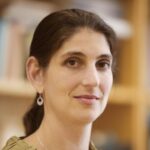 Laura Kubzansky, PhD is Professor of Social and Behavioral Sciences, co-director of the Lee Kum Sheung Center for Health and Happiness, and director of the Society and Health Laboratory at the Harvard T.H. Chan School of Public Health.
Laura Kubzansky, PhD is Professor of Social and Behavioral Sciences, co-director of the Lee Kum Sheung Center for Health and Happiness, and director of the Society and Health Laboratory at the Harvard T.H. Chan School of Public Health.
Dr. Kubzansky has published extensively on the role of psychological and social factors in health, with a focus on the effects of stress and emotion on heart disease. Primary lines of research include: 1) studying whether and how stress, emotion and other psychological factors may help to explain the relationship between social status and health; 2) studying whether and how positive psychological functioning and positive aspects of the social environment may lead to greater longevity and healthier aging. Other research projects and interests include biobehavioral mechanisms linking emotions, social relationships, and health; defining and measuring aspects of well-being; relationships between early childhood environments, resilience, and healthy aging; interactions between stress and environmental exposures (e.g., lead, air pollution) and how they influence health; workplace and other social conditions in relation to well-being; strategies for modifying psychological well-being.
 Rhonda V. Magee M.A. Sociology, J.D. is a Professor of Law at the University of San Francisco and an internationally recognized thought and practice leader focused on integrating mindfulness into higher education, law and social change work. A prolific author, she draws on law and legal history to weave storytelling, poetry, analysis and practices into inspiration for changing how we think, act and live better together in a rapidly changing world.
Rhonda V. Magee M.A. Sociology, J.D. is a Professor of Law at the University of San Francisco and an internationally recognized thought and practice leader focused on integrating mindfulness into higher education, law and social change work. A prolific author, she draws on law and legal history to weave storytelling, poetry, analysis and practices into inspiration for changing how we think, act and live better together in a rapidly changing world.
Dr. Epel is the author of numerous articles and book chapters on mindfulness in legal education, and on teaching about race using mindfulness, including “Educating Lawyers to Meditate?” 79 UMKC L. Rev. 535 (2011), “The Way of ColorInsight: Understanding Race and Law Effectively Using Mindfulness-Based ColorInsight Practices”, 8 Georgetown J. of Mod. Crit. Race Perspectives 251 (2016), “Teaching Mindfulness with Mindfulness of Diversity,” in McCown et al, Resources for Teaching Mindfulness: An International Handbook (Springer, 2017), and “Community Engaged Mindfulness and Social Justice: An Inquiry and Call to Action”, in Purser et al., Handbook of Mindfulness: Culture, Context and Social Engagement (2017).
Her first book, The Inner Work of Racial Justice: Healing Ourselves and Transforming Our Communities Through Mindfulness, was published in September 2019 by TarcherPerigee, a member of the Penguin Random House Group, with paperback issued in September 2021.
 Tyler J. VanderWeele, Ph.D., is the John L. Loeb and Frances Lehman Loeb Professor of Epidemiology in the Departments of Epidemiology and Biostatistics at the Harvard T.H. Chan School of Public Health, and Director of the Human Flourishing Program and Co-Director of the Initiative on Health, Religion and Spirituality at Harvard University. He holds degrees from the University of Oxford, University of Pennsylvania, and Harvard University in mathematics, philosophy, theology, finance, and biostatistics.
Tyler J. VanderWeele, Ph.D., is the John L. Loeb and Frances Lehman Loeb Professor of Epidemiology in the Departments of Epidemiology and Biostatistics at the Harvard T.H. Chan School of Public Health, and Director of the Human Flourishing Program and Co-Director of the Initiative on Health, Religion and Spirituality at Harvard University. He holds degrees from the University of Oxford, University of Pennsylvania, and Harvard University in mathematics, philosophy, theology, finance, and biostatistics.
His methodological research is focused on theory and methods for distinguishing between association and causation in the biomedical and social sciences and, more recently, on psychosocial measurement theory. His empirical research spans psychiatric and social epidemiology; the science of happiness and flourishing; and the study of religion and health. He is the recipient of the 2017 Presidents’ Award from the Committee of Presidents of Statistical Societies (COPSS). He has published over four hundred papers in peer-reviewed journals; is author of the books Explanation in Causal Inference (2015), Modern Epidemiology (2021), and Measuring Well-Being (2021); and he also writes a monthly blog posting on topics related to human flourishing for Psychology Today.
ADDITIONAL ACCREDITATION INFORMATION:
NURSES Harvard Medical School is accredited as a provider of nursing continuing professional development by the American Nurses Credentialing Center’s Commission on Accreditation. This activity is approved for 27.75 contact hours. Contact hours are awarded commensurate with participation and completion of the online evaluation and attendance attestation. We suggest claiming your hours within 30 days of the activity date; after this time, the attendance attestation will still be required to claim your hours.
PSYCHOLOGISTS This course will be submitted for continuing education credits.
SOCIAL WORKERS This course will be submitted for continuing education credits.
NURSE PRACTITIONERS For the purpose of recertification, the American Academy of Nurse Practitioners Certification Board and American Nurses Credentialing Center accept AMA PRA Category 1 Credit™ issued by organizations accredited by the ACCME (Accreditation Council for Continuing Medical Education). We would also suggest that learners check with their state licensing board to ensure they accept reciprocity with AMA PRA Category 1 Credit™ for re-licensure.
PHYSICIAN ASSISTANTS The National Commission on Certification of Physician Assistants (NCCPA) states that AMA PRA Category 1 Credits™ are acceptable for continuing medical education requirements for recertification. We would also suggest that learners check with their state licensing board to ensure they accept reciprocity with AMA PRA Category 1 Credit™ for re-licensure.
CANADIAN ACCREDITATION The Royal College of Physicians and Surgeons of Canada recognizes conferences and workshops held outside of Canada that are developed by a university, academy, hospital, specialty society or college as accredited group learning activities.
EUROPEAN ACCREDITATION The American Medical Association (AMA) has an agreement of mutual recognition of continuing medical education (CME) credit with the European Union of Medical Specialties (UEMS). Additional information regarding this agreement may be found here: https://www.ama-assn.org/education/ama-pra-credit-system/agreement-european-union-medical-specialties-uems
Please contact Jocelyn Meek at jmeek@partners.org for information on accreditation status.
Register for The Herbert Benson, MD Course in Mind Body Medicine October 21-23, 2020
Registration is now open for the Herbert Benson, MD Course in Mind Body Medicine, BHI’s celebrated continuing medical education (CME) course. The course will be held via live stream October 21-23, 2020.
Participants will get
- The latest clinical approaches and integrative models of care
- Cutting-edge research into the linkages between the brain and the body
- Education on genomics, transcriptomics, metabolomics ad how to leverage recent advances in the neuroimaging of contemplative states
- Current data on stress, stress management and resilience enhancement, and their impacts on patient health and treatment options
Keynote speakers are world-renowned meditation teacher and loving kindness guru Sharon Salzberg and emotional intelligence researcher and expert Daniel Goleman, PhD. Both of these celebrated speakers have storied careers in the field and multiple New York Times bestsellers to their credit.
For course scheduling, information and to register, please visit mindbody.hmscme.com. This program is among the highest-rated Harvard Medical School CME course and it sold out last year.
The Harvard Medical School is accredited by the Accreditation Council for Continuing Medical Education (ACCME) to provide continuing medical education for physicians. The Harvard Medical School designates this live activity for a maximum of 21.75 AMA PRA Category 1 Credits™. Physicians should claim only the credit commensurate with the extent of their participation in the activity.
Harvard Medical School is accredited as a provider of nursing continuing professional development by the American Nurses Credentialing Center’s Commission on Accreditation. This activity is approved for 21.75 contact hours. Contact hours are awarded commensurate with participation and completion of the online evaluation and attendance attestation. We suggest claiming your hours within 30 days of the activity date, after this time, the attendance attestation will still be required to claim your hours.
This program has been approved for 21.5 Social Work Continuing Education hours for re-licensure, in accordance with 258 CMR. Collaborative of NASW and the Boston College and Simmons Schools of Social Work Authorization Number D 81744.
This course has also been submitted for continuing education credits for psychologists. For more information, contact jmeek@partners.org.
About our Keynotes
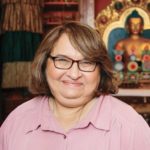 Sharon Salzberg, a pioneer in the field of meditation, a world-renowned teacher, and best-selling author, has played a pivotal role bringing meditation and mindfulness into mainstream American culture since 1974. She is cofounder of The Insight Meditation Society, in Barre, Massachusetts, and has authored 11 books, including the New York Times best-seller, Real Happiness, her seminal work, Lovingkindness, and Real Love: The Art of Mindful Connection. Her latest book, launching in June of 2020 is, Real Change: Mindfulness to Heal Ourselves and the World. Acclaimed for her down-to-earth and relatable teaching style, Sharon offers a secular, modern approach to Buddhist teachings, making them instantly accessible. Her writing can be found on Medium, On Being, the Maria Shriver blog, and Huffington Post. Sharon is also the host of her own podcast, The Metta Hour, with more than 90 episodes featuring interviews with the top leaders and voices in the meditation and mindfulness movement.
Sharon Salzberg, a pioneer in the field of meditation, a world-renowned teacher, and best-selling author, has played a pivotal role bringing meditation and mindfulness into mainstream American culture since 1974. She is cofounder of The Insight Meditation Society, in Barre, Massachusetts, and has authored 11 books, including the New York Times best-seller, Real Happiness, her seminal work, Lovingkindness, and Real Love: The Art of Mindful Connection. Her latest book, launching in June of 2020 is, Real Change: Mindfulness to Heal Ourselves and the World. Acclaimed for her down-to-earth and relatable teaching style, Sharon offers a secular, modern approach to Buddhist teachings, making them instantly accessible. Her writing can be found on Medium, On Being, the Maria Shriver blog, and Huffington Post. Sharon is also the host of her own podcast, The Metta Hour, with more than 90 episodes featuring interviews with the top leaders and voices in the meditation and mindfulness movement.
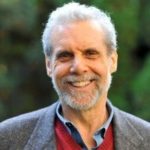 Daniel Goleman is an internationally known psychologist who lectures frequently to professional groups, business audiences, and on college campuses. As a science journalist Goleman reported on the brain and behavioral sciences for The New York Times for many years. His 1995 book, Emotional Intelligence was on The New York Times bestseller list for a year-and-a-half, with more than 5,000,000 copies in print worldwide in 40 languages and has been a best seller in many countries. Apart from his books on emotional intelligence, Goleman has written books on topics including self-deception, creativity, transparency, meditation, social and emotional learning, ecoliteracy and the ecological crisis.
Daniel Goleman is an internationally known psychologist who lectures frequently to professional groups, business audiences, and on college campuses. As a science journalist Goleman reported on the brain and behavioral sciences for The New York Times for many years. His 1995 book, Emotional Intelligence was on The New York Times bestseller list for a year-and-a-half, with more than 5,000,000 copies in print worldwide in 40 languages and has been a best seller in many countries. Apart from his books on emotional intelligence, Goleman has written books on topics including self-deception, creativity, transparency, meditation, social and emotional learning, ecoliteracy and the ecological crisis.
Now Accepting Watts Scholarship Applications
The Benson-Henry Institute (BHI) for Mind Body Medicine at MGH is pleased to announce it is now accepting applications for its 2022 Watts Scholarship program. Launched in 2017, the Watts Scholarship fully funds two clinicians in earning Stress Management and Resiliency Training (SMART) Certification for Healthcare Practitioners.
BHI’s copyrighted SMART program is research validated and has been shown to have far-reaching positive effects on overall health and wellness, teaching self-care skills that are especially as we reemerge from the COVID19 pandemic.
Through the generous support of Mr. Randy Watts, an enthusiastic benefactor of BHI’s work, two training scholarships will be available to cover the total training costs of scholarship awardees who work with underserved populations. One scholarship will be awarded to an MGB employee, and the other to a non-MGB clinician. Applications are due July 1, 2022.
“Stress is a leading cause of many health conditions, and our research clearly shows we can improve our own health outcomes by reducing stress through self-care,” said BHI Director Gregory L. Fricchione, MD. “We believe spreading SMART – especially to those who are at greatest stress risk – is critical to the health of our country. We are so grateful to Randy Watts for helping us bring this important work to those who need it most.”
Watts Scholarship Information
Licensed healthcare clinicians who would like to become certified to provide the Stress Management and Resiliency Training (SMART) program to their Partners patients are eligible to apply. Full details and training requirements for becoming a BHI SMART-Certified Healthcare Practitioner can be found here.
Applications are due July 1, 2022 and eligibility requirements include:
- Applicants must be a practicing healthcare clinician licensed in one of the following categories:
- Doctor (MD, DO)
- Nurse (RN, NP)
- PhD/EdD/PsyD
- Master’s-level social worker
- Master’s-level mental health counselor
- Physician’s Assistant
- Applicants must demonstrate their work with underserved patient populations who will benefit from SMART training.
- Applicants must be able to complete all training activities within the course of one (1) year.
Questions? Email jmeek@partners.org.
Katherine Rosa wins Prestigious Grant Award as Part of MGH Nursing Research Day
Katherine Rosa, PhD, CNP, FNP-BC, was honored with a prestigious grant award as part of Massachusetts General Hospital’s (MGH) annual Nursing Research Day celebration May 9th. Dr. Rosa won the 3rd annual Jeannette Ives Erickson Research Institute Grant award honoring research that is “innovative, caring, grounded in scientific principles and guided by the goal of improving nursing practice.”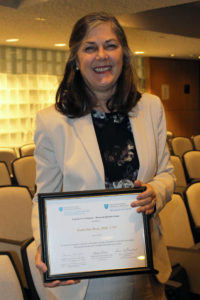
Dr. Rosa joined BHI in 2018 as a clinician researcher; she sees patients in the clinic and leads Stress Management and Resiliency Training (SMART) groups at the institute. The award is accompanied by a $5,000 grant that will fund her research: Psychometric testing of a tool to measure Patients PeRception of NursE Patient ReLationship as HeAling Transformations ScalE (RELATE Scale).
“I am honored and thrilled to have received the Jeanette Ives Erickson research award. This grant enables me to test the reliability and validity of Rosa’s RELATE scale. I’m excited for the opportunity to further this research on nurses caring for patients with chronic illness,” Dr. Rosa said.
The award is named for Jeannette Ives Erickson, RN, DNP, chief nurse emerita at Massachusetts General Hospital, Instructor at Harvard Medical School, and Professor at MGH Institute of Health Professions. Ms. Erickson, who helped present the award, also serves as the chair, Chief Nurse Council, Partners HealthCare System and as Chair on the MGH Institute Board of Trustees.
“Katherine is an excellent clinician and a talented researcher. We are truly excited to have her on the BHI-MGH team,” said Darshan Mehta, MD, MPH, BHI’s Medical Director. “This award speaks to her standing and professionalism in the nursing community.”
MGH has the largest hospital-based nursing research program in the United States, said Susan A. Slaugenhaupt, PhD, Scientific Director of the Mass General Research Institute and a Professor of Neurology (Genetics) at Harvard Medical School.
“You see a problem, ask a research question and very quickly your work is translated into improving care for our patients,” Dr. Slaugenhaupt said to the scores of nurses and hospital administrators gathered in the O’Keefe Auditorium.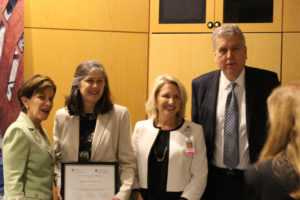
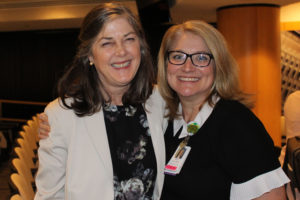
Nursing Research Day is held in May during Nurse Recognition Week at MGH. Organized by the Yvonne L. Munn Center for Nursing Research, the day provides a forum for nurses to network with other nurse researchers and national scholars to exchange ideas around advancing nursing practice through research and quality improvement.
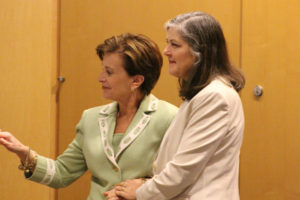
Elyse R. Park, Ph.D., MPH Among MGH’s Highest-Awarded Researchers
Elyse R. Park, PhD, MPH BHI’s Director of Behavioral Research, is among Massachusetts General Hospital’s top 25 researchers for sponsored research awards. Dr. Park’s clinical research focuses on tobacco treatment for cancer patients, cancer risk perceptions, cancer survivor quality of life, and resiliency.
Dr. Park is currently overseeing $7.2 million in grant-funded research projects, including two $2.5 million multi-year studies funded by the national Institutes of Health (NIH). Her studies involve the integration of mind body skills – specifically stress management and resiliency training– into tobacco treatment for cancer patients.
“We’ve shown in our last randomized treatment trial that the integration of mind body skills was really a key factor in whether the tobacco treatment was successful for cancer patients,” Dr. Park said. “The long and short of it is that cancer patients are more likely to quit and remain smoke-free if we teach them stress management coping skills and resiliency perspective strategies.”
Previous trials were conducted in an academic medical setting like MGH, yet the current trials will be implemented with community-based cancer center patients via an online telehealth platform. Dr. Park praised Tobacco Treatment Counselors Laura Malloy, LICSW, CTTS and Irina Gonzalez, MD, CTTS, who are working with her on these studies and possess unique skills in both tobacco treatment and mind-body techniques.
“We are so proud of Elyse – she is an extraordinary researcher and is among the most generative of our scientists here at MGH,” said BHI Director Gregory Fricchione, MD. “She is a mentor to a whole new generation of behavioral health researchers and BHI is very lucky to have her as a leader in this area.”
Dr. Park directs the MGH Clinical Research Program’s Qualitative Research Unit, teaching MGH investigators how to use qualitative research to inform interventions and measurement design. Her research has been supported by funding from the National Cancer Institute, American Cancer Society, Robert Wood Johnson Foundation, and the Livestrong Foundation. She has published over 180 peer reviewed original articles. She is also an Associate Professor of Psychiatry at Harvard Medical School and a senior scientist at MGH’s Mongan Institute for Health Policy. In 2017, she was honored as one of the 100 Everyday Amazing heroes by the MGH Cancer Center.
At the Benson-Henry Institute, Dr. Park has created a manualized version of the Stress Management and Resiliency Training- Relaxation Response Resiliency program (SMART-3RP) which is currently being tested with a variety of medical patient, clinician, and community-based populations.
Now Accepting 2019 Watts Scholarship Applications
The Benson-Henry Institute (BHI) for Mind Body Medicine at Massachusetts General Hospital (MGH) is pleased to announce it is now accepting applications for the 2019 Watts Scholarship program. Launched in 2017, the Watts Scholarship fully funds two clinicians in earning Stress Management and Resiliency Training (SMART) Certification for Healthcare Practitioners.
The BHI’s copyrighted SMART program has been shown to have far-reaching positive effects on overall health and wellness – a 2015 preliminary study showed patients who participated in BHI programs reduced their medical visits on average by 43% in the year after taking part.
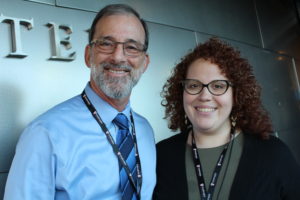
Through the generous support of Mr. Randy Watts, an enthusiastic benefactor of BHI’s work, two training scholarships will be available to cover the total training costs of scholarship awardees who work with under-served populations. This year, Mr. Watts has stipulated that one scholarship be awarded to a Partners employee, and the other be available to non-Partners clinicians, as well.
“Stress is a leading cause of many health conditions, and our research clearly shows we can improve our own health outcomes by reducing stress through self-care,” said BHI Director Gregory L. Fricchione, MD. “We believe spreading SMART – especially to those who are at greatest stress risk – is critical to the health of our country. We are so grateful to Randy Watts for helping us bring this important work to those who need it most.”
In its first year, the Watts Scholarship funded two Boston-based clinicians: Mary Susan Convery, MSW, LICS, a clinical social work specialist and member of the Social Service Leadership team at MGH and Sarah Wettenstein, LICSW, a behavioral health clinician in the Office-Based Addiction Treatment Program of the Boston Health Care for the Homeless. 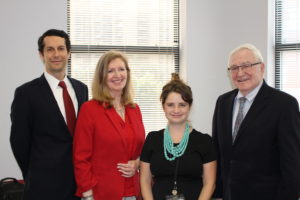
In 2018, the program supported studies for Paul Arnstein, PhD, RN, PhD, FNP-C, ACNS-BC, Director of MGH Cares about Pain Relief at Massachusetts General Hospital and a leading researcher on the value of nurse-led interventions for chronic pain patients. The Watts Committee also selected Dr. Irma Torres-Rivera, who is using SMART to help residents of San Juan, Puerto Rico build resilience and manage stress as the entire island works to rebuild from the devastating effects of Hurricane Maria.
Watts Scholarship Information
Licensed healthcare clinicians who would like to become certified to provide the Stress Management and Resiliency Training (SMART) program to their patients are eligible to apply. Full details and training requirements for becoming a BHI SMART-Certified Healthcare Practitioner can be found here.
Applications are due July 12, 2019 and eligibility requirements include:
- Applicants must be a practicing healthcare clinician licensed in one of the following categories:
– Doctor (MD, DO)
– Nurse (RN, NP)
– PhD/EdD/PsyD
– Master’s-level social worker
– Master’s-level mental health counselor
- Applicants must demonstrate their work with under-served patient populations who will benefit from SMART training.
- Applicants must be able to complete all training activities within the course of 1 year.
If you have questions or require further information, please contact Jocelyn Meek at jmeek@partners.org.



